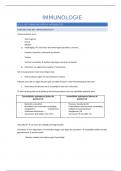Summary
Summary Book 7 of the Aeneid (A Level OCR Classical Civilisation Notes)
The two page document features notes on Book 7 of Virgil's Aeneid. The notes include the introduction of Camilla and summarised notes on the War on Latium. These notes are really helpful for students learning A Level OCR Classical Civilisation, specifically the World of Hero course. Background info...
[Show more]












